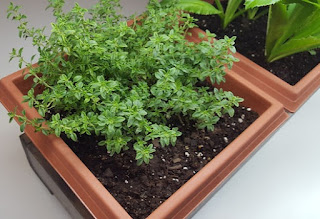What fertilizer is good for thyme?
What fertilizer is good for thyme?
Thyme, with its fragrant leaves and versatile culinary uses, is a delightful herb to grow in your garden or indoor pots. To ensure that your thyme plants flourish, it's essential to provide them with the right nutrients through proper fertilization. In this article, we'll explore the best fertilizers for thyme and how to use them effectively.
I. Understanding Thyme's Nutritional Needs:
Before diving into specific fertilizers, let's first understand what thyme requires to thrive:
1. Nutrient Requirements:
- Thyme prefers slightly lean soil.
- It thrives in well-drained, slightly alkaline to neutral soil (pH 6.0-7.0).
- Thyme generally requires a balanced supply of essential nutrients, including nitrogen (N), phosphorus (P), and potassium (K), as well as trace minerals.
II. Types of Fertilizers:
Now that we know thyme's nutritional needs, let's explore suitable types of fertilizers:
1. Organic Fertilizers:
- Compost: Incorporating well-rotted compost into the soil provides a slow-release source of nutrients.
- Fish Emulsion: This organic liquid fertilizer is rich in nitrogen and beneficial for thyme's growth.
2. Synthetic Fertilizers:
- Balanced NPK Fertilizer: A balanced fertilizer with equal or near-equal amounts of nitrogen, phosphorus, and potassium (e.g., 10-10-10) can be used sparingly.
III. Fertilizing Guidelines:
Here's how to apply fertilizers to your thyme plants effectively:
1. Timing:
- Apply fertilizer in the spring when new growth begins.
- Avoid fertilizing in late summer to prevent encouraging excessive growth before winter.
2. Application Rates:
- For organic fertilizers, follow package instructions for application rates.
- Synthetic fertilizers should be used sparingly to prevent over-fertilization, which can harm thyme.
3. Avoid Over-Fertilization:
- Thyme is sensitive to excessive fertilization, so err on the side of caution.
- Signs of over-fertilization include weak growth, reduced aroma, and loss of flavor in the leaves.
IV. Additional Tips for Healthy Thyme:
To ensure your thyme plants thrive, consider the following tips:
1. Mulching:
- Apply a layer of organic mulch around the plants to help retain soil moisture and reduce weed competition.
2. Pruning:
- Regularly trim your thyme to encourage bushier growth and better air circulation.
3. Sunlight:
- Ensure your thyme receives at least 6-8 hours of sunlight daily.
Conclusion:
Fertilizing thyme properly is essential for robust growth and a bountiful harvest. By understanding its nutritional needs and choosing the right fertilizer, you can enjoy fresh, aromatic thyme in your culinary creations year-round. Remember to follow fertilization guidelines and provide your thyme plants with the care they deserve for a thriving herb garden.



0 Comments